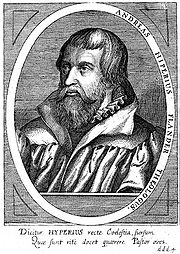
Andreas Hyperius
Encyclopedia

Ypres
Ypres is a Belgian municipality located in the Flemish province of West Flanders. The municipality comprises the city of Ypres and the villages of Boezinge, Brielen, Dikkebus, Elverdinge, Hollebeke, Sint-Jan, Vlamertinge, Voormezele, Zillebeke, and Zuidschote...
.
Life
He had a humanist education, and studied at TournaiTournai
Tournai is a Walloon city and municipality of Belgium located 85 kilometres southwest of Brussels, on the river Scheldt, in the province of Hainaut....
and Paris. He was resident in England from 1536 to 1540, and in and in 1542 was appointed professor of theology at Marburg
Marburg
Marburg is a city in the state of Hesse, Germany, on the River Lahn. It is the main town of the Marburg-Biedenkopf district and its population, as of March 2010, was 79,911.- Founding and early history :...
.
Works
His theology lies between Lutheran and Reformed beliefs. Influenced by Martin Butzer, he was not a strict Lutheran. Jean Calvin endorsed his erudition.He wrote the first Protestant text, De formandis concionibus sacris (On the Making of Sacred Discourses), solely devoted to systematic homiletics, in other words preaching considered as a branch of rhetoric
Rhetoric
Rhetoric is the art of discourse, an art that aims to improve the facility of speakers or writers who attempt to inform, persuade, or motivate particular audiences in specific situations. As a subject of formal study and a productive civic practice, rhetoric has played a central role in the Western...
. It was translated in English by John Ludham, as The Practise of Preaching (1577). Another English translation by Ludham was A Speciall Treatise of Gods Providence (c. 1588). Dietrich Bonhoeffer
Dietrich Bonhoeffer
Dietrich Bonhoeffer was a German Lutheran pastor, theologian and martyr. He was a participant in the German resistance movement against Nazism and a founding member of the Confessing Church. He was involved in plans by members of the Abwehr to assassinate Adolf Hitler...
emphasised the role Hyperius had played in early Protestantism.
The Methodus theologiae is a selection from, and method for reading, the Church Fathers
Church Fathers
The Church Fathers, Early Church Fathers, Christian Fathers, or Fathers of the Church were early and influential theologians, eminent Christian teachers and great bishops. Their scholarly works were used as a precedent for centuries to come...
.
In his overall approach, he sought a firm basis in the Bible, rigidly, and held that before practical theology can be put in force, it must be made a part of systematic theological study, and must not be taught fragmentarily. Demanding an immense amount of preliminary reading on the part of the student, covering all practical theology except missions, he held that such reading would involve preparation for the practical work of the ministry. All must be squared with the Bible, or, where the Bible did not contain specific data, with the commandments of love for God and one's neighbor.
In addition, he urged the preparation of a work on church government, including the data of the New Testament, relevant portions of church history, excerpts from the councils, papal decrees, Church Fathers, and works on dogmatics, liturgics, and related materials.
Works
- De formandis concionibus sacris (1553, enlarged 1562)
- De theologo, seu de ratione studii theologici, libri IIII (1556)
- Elementa christianae religionis (1563)
- Methodi theologiae, sive praecipuorum christianae religionis locorum conmunium, libri tres (1568).

